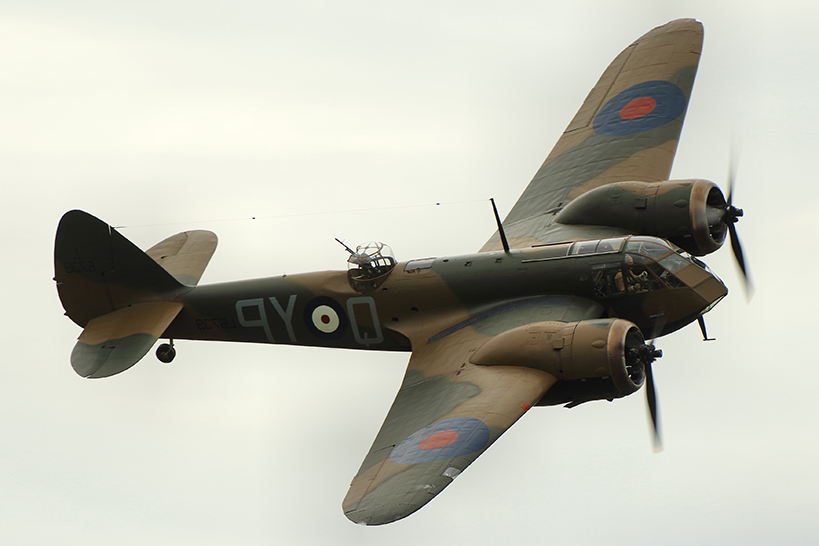Bartley, Antony Charles
- Date of birth:
- March 28th, 1919 (Dacca, India)
- Date of death:
- January 5th, 2001 (Cork, Ireland)
- Nationality:
- British (1801-present, Kingdom)
Biography
Service number 41816.
Anthony Bartley was born on March 28 1919 at Dacca in India. His father, Sir Charles Bartley, was an Irish barrister who served as a judge in the Calcutta High Court. With his brother and sister he was sent to kindergarten in England when he was five. Until the age of 14 he was at prep school and on the occasional visit from his father, found it difficult to recognise him. He attended Stowe School then learned to fly and qualified in 1938. After a brief trip to Frankfurt, he volunteered for the RAF on a short service commission and joined 92 Squadron at Tangmere in November 1939 with the fighter version of the twin engine Bristol Blenheim.
After the Blenheims had been replaced by Spitfires in March 1940, Bartley fought over Dunkirk during the fall of France. When, in a last resort to bolster French morale, Churchill flew to Paris later that year, Bartley was part of his escort. On the return journey, not expecting enemy contact, Bartley unloaded one of his machine gun tanks and carefully placed in two bottles of brandy. Unfortunately, on landing, an over-zealous armourer opened the ammunition bay and both bottles smashed on the tarmac. Seeing Bartley's despondency Churchill came across to him and from his pockets produced two identical bottles. All he said was: "Smart thinking young man. It is the last chance either of us is going to get." He eventually flew over the evacuation of the British Expeditionary Force.
In March 1941 he was posted as a flight commander to No 74 Squadron at Manston, on the Kent coast. But he was soon a flying instructor at No 56 and No 53 Operational Training Units (OTU)
In the summer of 1941, Bartley was attached to Vickers-Supermarine as a production test pilot, and made a significant contribution to the development of the Spitfire. Among the weaknesses that Bartley identified was the inadequacy of the Spitfire's rearward view during combat. But improving this would have required a major alteration in the geometry of the rear fuselage, which was made impossible by production pressures in 1941. During this time he performed the acrobatics for the film The First of The Few (1942) which chronicled the life of the Spitfire's designer, R J Mitchell, played by Leslie Howard.
In the New Year of 1942, Bartley returned to operations with No 65 Squadron - receiving command in May -.
In August 1942, Bartley received command of No 111 Squadron and led it to North Africa during the November Operation Torch landings. He shot down several enemy fighters over Tunisia, including at least three Me 109s.
In January 1943, Bartley hitched a ride home in a four-engine American Liberator bomber which lost two engines and crash-landed in Wales. Bartley was not injured. In February of that year, he was posted to Headquarters No 83 Group in the new Tactical Air Force forming within Fighter Command.
After training squadrons in ground attack and Army support for the forthcoming invasion of Normandy, Bartley attended the US Command and General Staff College at Fort Leavenworth, Kansas, and taught at the School of Air Tactics at Orlando, Florida.
This proved useful when, on his return, he became liaison officer with the 70th Fighter Wing of the US 9th Air Force, moving on, in October 1944, to Transport Command to set up staging posts in Europe. When the war ended in Europe in May 1945, Bartley volunteered for service against the Japanese.
The Pacific and Far East war ended within weeks and Bartley fixed a lift home in a Douglas Dakota which was returning for an overhaul. He was released from the service and in 1946 returned to Vickers-Armstrong as a test pilot and sales executive.
In 1945 he married Deborah Kerr. In 1947 he went to Hollywood where his wife starred with his old friend Clark Gable in The Huckster while he studied film production at MGM Studios. He began writing and producing television films for Fireside Theater and Douglas Fairbanks Presents. He later joined CBS and wrote and produced the TV series Assignment Foreign Legion which was highly successful in the UK.
After his marriage was dissolved in 1958 Bartley joined Associated-Rediffusion and in 1964 moved to Canada. Two years later he moved to Barbados where he was appointed director of the Caribbean Broadcasting Corporation. In 1971 he moved to Cork where he enjoyed 30 very happy years with his second wife, Vicky.
His autobiography, "Smoke Trails in the Sky", was published in 1984.
Promotions:
21st October, 1939: Pilot Officer (P)
23th January, 1940 Pilot Officer
21st October, 1940: Flying Officer
? : Flight Lieutenant
1st July, 1945: Squadron Leader (T)
Do you have more information about this person? Inform us!
- Period:
- Second World War (1939-1945)
- Rank:
- Pilot Officer
- Awarded on:
- October 25th, 1940
"Pilot Officer Bartley has shot down at least eight enemy aircraft. He has always displayed great coolness in action and proved himself a clever and determined fighter."
- Period:
- Second World War (1939-1945)
- Rank:
- Squadron Leader
- Unit:
- No. 111 Squadron, Royal Air Force
- Awarded on:
- February 16th, 1943
"In the operations in North Africa, Squadron Leader Bartley took part in numerous sorties on which he destroyed 2 hostile aircraft, bringing his total victories to 13. His great skill, courage and determination have been an inspiration to all."
Awarded as a bar for on the ribbon of the first DFC.
Sources
- - SHORES, CH. & WILLIAMS, C., Aces High, Grub Street, London, 1994.
- The London Gazette Issue 34978 published on the 25 October 1940
- Supplement to The london Gazette Issue 35904 published on the 12 February 1943
- The Times- Obituaries




